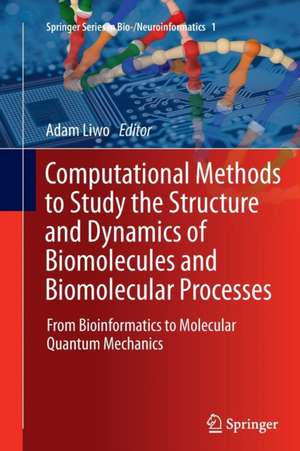Computational Methods to Study the Structure and Dynamics of Biomolecules and Biomolecular Processes: From Bioinformatics to Molecular Quantum Mechanics: Springer Series in Bio-/Neuroinformatics, cartea 1
Editat de Adam Liwoen Limba Engleză Paperback – 24 sep 2016
This book provides a comprehensive overview of modern computer-based techniques for computing the structure, properties and dynamics of biomolecules and biomolecular processes. The twenty-two chapters, written by scientists from all over the world, address the theory and practice of computer simulation techniques in the study of biological phenomena. The chapters are grouped into four thematic sections dealing with the following topics: the methodology of molecular simulations; applications of molecular simulations; bioinformatics methods and use of experimental information in molecular simulations; and selected applications of molecular quantum mechanics. The book includes an introductory chapter written by Harold A. Scheraga, one of the true pioneers in simulation studies of biomacromolecules.
| Toate formatele și edițiile | Preț | Express |
|---|---|---|
| Paperback (1) | 1297.67 lei 6-8 săpt. | |
| Springer Berlin, Heidelberg – 24 sep 2016 | 1297.67 lei 6-8 săpt. | |
| Hardback (1) | 1648.11 lei 6-8 săpt. | |
| Springer International Publishing – 14 ian 2019 | 1648.11 lei 6-8 săpt. |
Preț: 1297.67 lei
Preț vechi: 1622.09 lei
-20% Nou
Puncte Express: 1947
Preț estimativ în valută:
248.31€ • 259.79$ • 206.27£
248.31€ • 259.79$ • 206.27£
Carte tipărită la comandă
Livrare economică 02-16 aprilie
Preluare comenzi: 021 569.72.76
Specificații
ISBN-13: 9783662508473
ISBN-10: 3662508478
Pagini: 810
Ilustrații: XIV, 810 p. 210 illus., 90 illus. in color.
Dimensiuni: 155 x 235 x 42 mm
Greutate: 1.13 kg
Ediția:Softcover reprint of the original 1st ed. 2014
Editura: Springer Berlin, Heidelberg
Colecția Springer
Seria Springer Series in Bio-/Neuroinformatics
Locul publicării:Berlin, Heidelberg, Germany
ISBN-10: 3662508478
Pagini: 810
Ilustrații: XIV, 810 p. 210 illus., 90 illus. in color.
Dimensiuni: 155 x 235 x 42 mm
Greutate: 1.13 kg
Ediția:Softcover reprint of the original 1st ed. 2014
Editura: Springer Berlin, Heidelberg
Colecția Springer
Seria Springer Series in Bio-/Neuroinformatics
Locul publicării:Berlin, Heidelberg, Germany
Cuprins
Molecular simulations: methodology.- Molecular simulations: applications.- Use of structural database or experimental information in modeling protein structure and dynamics.- Applications of molecular quantum mechanics.
Recenzii
From the book reviews:
“The purpose of the book is to provide an overview of modern methods and techniques for simulating and modeling biological systems. … the book is an excellent introductory text that could be very useful for graduate students who are just starting research projects and need to establish a broader view of simulation methodologies.” (Alexander Tzanov, Computing Reviews, June, 2014)
“The purpose of the book is to provide an overview of modern methods and techniques for simulating and modeling biological systems. … the book is an excellent introductory text that could be very useful for graduate students who are just starting research projects and need to establish a broader view of simulation methodologies.” (Alexander Tzanov, Computing Reviews, June, 2014)
Textul de pe ultima copertă
Since the second half of the 20th century machine computations have played a critical role in science and engineering. Computer-based techniques have become especially important in molecular biology, since they often represent the only viable way to gain insights into the behavior of a biological system as a whole. The complexity of biological systems, which usually needs to be analyzed on different time- and size-scales and with different levels of accuracy, requires the application of different approaches, ranging from comparative analysis of sequences and structural databases, to the analysis of networks of interdependence between cell components and processes, through coarse-grained modeling to atomically detailed simulations, and finally to molecular quantum mechanics.
This book provides a comprehensive overview of modern computer-based techniques for computing the structure, properties and dynamics of biomolecules and biomolecular processes. The twenty-two chapters, written by scientists from all over the world, address the theory and practice of computer simulation techniques in the study of biological phenomena. The chapters are grouped into four thematic sections dealing with the following topics: the methodology of molecular simulations; applications of molecular simulations; bioinformatics methods and use of experimental information in molecular simulations; and selected applications of molecular quantum mechanics. The book includes an introductory chapter written by Harold A. Scheraga, one of the true pioneers in simulation studies of biomacromolecules.
This book provides a comprehensive overview of modern computer-based techniques for computing the structure, properties and dynamics of biomolecules and biomolecular processes. The twenty-two chapters, written by scientists from all over the world, address the theory and practice of computer simulation techniques in the study of biological phenomena. The chapters are grouped into four thematic sections dealing with the following topics: the methodology of molecular simulations; applications of molecular simulations; bioinformatics methods and use of experimental information in molecular simulations; and selected applications of molecular quantum mechanics. The book includes an introductory chapter written by Harold A. Scheraga, one of the true pioneers in simulation studies of biomacromolecules.
Caracteristici
Comprehensive overview of modern computer-based techniques for computing the structure, properties and dynamics of biomolecules and biomolecular processes Introduces theory and practice of molecular simulations, bioinformatics methods as well as selected applications of molecular quantum mechanics to the study of biological systems Edited and written by leading scientists in the field





